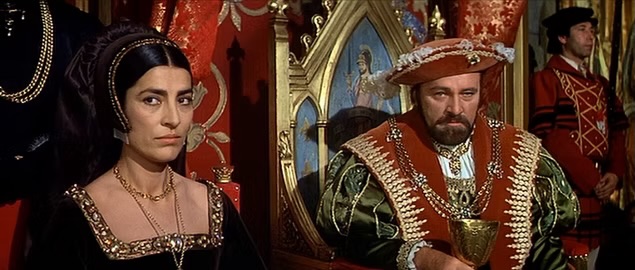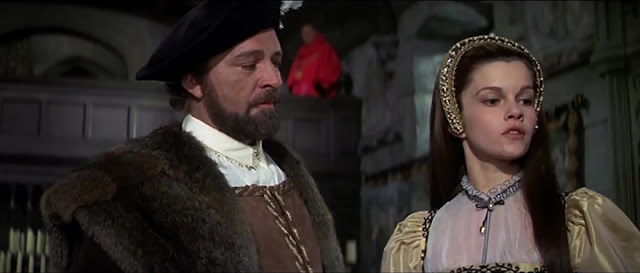Anne of the Thousand Days was marketed as a great love story. Hal Wallis himself says so in the trailer he narrated leading up to the release of his historical drama about King Henry VIII and Anne Boleyn. But the reality is more base and primal; this isn’t so much a love story as it is a story about lust and power, a story about how blind a person can be in the pursuit of that which they desire. The story of Henry and Anne is a known one that has been dramatized many times, including the more fictionalized telling The Other Boleyn Girl in 2008. The courtship, marriage, and eventual falling out these two figures had is well known and, knowing the end to this sad story, makes for a difficult film to keep an audience engaged.
Producer Hal Wallis was from old Hollywood. His name appears in the credits for Casablanca, The Adventures of Robin Hood, and Becket among many others. He has worked with some of the greats, including Humphrey Bogart, John Wayne, and even Elvis Presley. His career spanned over five decades, and he remained busy well into his eighties. Hal had an interest in history, specifically that of the British royalty. Henry VIII was a popular subject of the stage and screen specifically because of his penchant for marrying, a subject that put him at odds with the Catholic Church. He sired several illegitimate children, as well,with his various mistresses, but because of the Catholic Church’s refusal to allow divorce, he remained married to Catherine of Aragon, a marriage arranged between England and Spain, long after wishing to to end that union. His desire to escape that marriage and marry another caused a rift between the monarchy and the church that is still felt to this day. This kind of drama is perfect for an entertaining costume drama.
In 1948, Anne of the Thousand Days opened on the Broadway stage with Rex Harrison and Joyce Redman in the leads. The play proved immensely popular, lasting for 288 performances. Hollywood loves to take plays and make them into successful films, but there was a major problem with this one: the production code. In the late 1930s through the late 1950s, films had to adhere to the production code or they would not be granted distribution into the mainstream theaters. Without that distribution, there was no way a film could turn a profit. Anne of the Thousand Days had themes of adultery, illegitimacy, incest, and physical lust, all things the code prevented from being depicted on screen. What was allowed on the stage was not allowed in movie theaters and thus Anne of the Thousand Days remained un-produced.
It would take twenty years for Anne of the Thousand Days to go into production, waiting out the eventual dismissal of the production code in favor of the more leanient ratings system. Hal Wallis, who was still active in Hollywood, took the reins in late 1967. He was ready and able to finally put this story on the screen. His first thought was to cast Olivia Hussey, fresh off of filming Romeo and Juliet, in the title role of Anne Boleyn. But a quick meeting with her at a party celebrating her upcoming film soured him to the idea. Eventually, French/Canadian actress Geneviève Bujold landed the role.
For Henry VIII, Richard Burton, who had recently starred in Hal Wallis’ Beckett, was brought on. Burton fought to get Elizabeth Taylor in the role of Anne. The reasons behind this range from distrust in their personal lives, tax write-offs, and even a desperate attempt to keep each other sober. Elizabeth Taylor was far too old to be playing Anne, though, but she does get a cameo appearance that is so brief you have to freeze-frame the film to catch a glimpse of her face. Her figure, iconic as it is, is hard to miss, as are her uniquely colored eyes.
The story, as told in this film, is about Henry VIII, who has failed to produce a male heir to the throne through his wife, Catherine (Irene Papas). He has been enjoying a discreet affair with Mary Boleyn (Valerie Gearon), a daughter of one of his courtiers, Sir Thomas Boleyn (Michael Hordern), but he has grown tired of her affections, too. At a court ball, he notices Mary’s younger sister, Anne, who has just returned from being educated in France. Anne is engaged to be married, but Henry desires her and orders Cardinal Wolsey (Anthony Quayle), his Lord Chancellor and liaison to the Pope, to break the engagement.
When news reaches Anne of this, and of the King’s interest in her, she is initially upset and rebuffs his advances. King Henry refuses to force her to be his mistress but insists instead that he can win over her affections. Eventually, she begins to see the benefits of her position of power over him, as well as the possibilities of bearing an heir to the throne. But she insists that she will not bear him an illegitimate child. If she is to give him an heir, it must be through marriage, something that would require him to divorce his wife and jeopardize his treaty with Spain. Attempts to have the marriage annulled by the Pope end in failure, and, desperate for Anne, force him to side with her against the church. But things turn for the worse when Anne bears first a daughter, Elizabeth, and then a stillborn son. Soon, Henry has his eyes on someone else to provide the royal heir.
This is a fascinating look at historical events and how lust and desire can overwrite common sense and even faith. Henry VIII’s fight with the Catholic Church was the subject of a previous film, A Man for All Seasons, in 1966. That film took home the Best Picture Oscar, focusing more on the divorce of Catherine and Henry and the creation of the Church of England with King Henry as the Supreme Head. Some of that is in Anne of the Thousand Days, but it is not the primary focus of the film.
Instead, this film is more about the rise and fall of the relationship between Henry and Anne, with the greater emphasis on her softening towards him and her realization of the power she can have by being his Queen. It’s an interesting dynamic that Bujold does an excellent job conveying. This softening comes over a long period of time, and when it finally happens, it is believable. On the flip side, by taking so long to develop this relationship, the film feels padded and loses a lot of what makes a film enjoyable entertainment. It comes across as too stodgy and slow-paced to fully keep our interest. This is a serious problem for the entire middle section of the movie, leaving us begging for the part of the story we are all familiar with: their falling out and her eventual execution. Henry VIII, desperate to get out of his latest marriage, allows his servant Thomas Cromwell (John Colicos) to find a way to end the marriage. Thomas’ solution is to force a confession of adultery out of one of the Queen’s servants through torture. Anne manages to prove the accusations false but is still executed for treason, paving the way for Henry to marry another.
Despite the title, this film is more about Henry VIII than it is about Anne. The future queen doesn’t even enter the picture until about ten minutes in, and later there will be whole sequences of Henry moping and complaining about not having a son. When Anne is on screen, though, she is commanding it. One of the reasons Henry is attracted to her is because she can and does stand up to him, pushing him just far enough while trying to avoid going too far. That doesn’t always happen, though, and when she does push him too much, he strikes out at her. Bujold walks a delicate line in her portrayal of Anne, including in her final moments with the executioner’s blade at her throat.
This film would have probably fared better had it been released a decade earlier. As it was, Hollywood was in the process of morphing into what it would become heavily in the 1970s. Young new talent was taking over, and a film about 16th century British royals felt old-fashioned. This transition can be seen in the Academy Award nominations of that year. Traditional period dramas and musicals make up some of the list for Best Picture, but the films that made a more lasting impression were more offbeat or counter-culture. There was the downbeat Western Butch Cassidy and the Sundance Kid, the governmental conspiracy drama Z, and the winner that year: Midnight Cowboy, an X-rated drama about male prostitution. Films like Hello Dolly and especially Anne of the Thousand Days come across as relics of the past in comparison.
Anne of the Thousand Days is a perfectly fine period piece drama, but it feels like a film far older than it really is. These kinds of films were on their way out by 1969 but were still holding on for dear life. Were it a better written film, it would fare better, but unfortunately, it is too long and struggles to justify that length. Bujold and Burton are good, as usual, but even they cannot keep this film from becoming a slog to get through, especially in the middle third when very little of interest is happening. This would be the last time Hal Wallis would be nominated for an Oscar, and while this film is not a stain on his reputation, it’s not much of a highlight, either. It’s beautiful to look at, and the performances are first-rate, but the script lets it down, and it is a victim of being released about five years too late.
Academy Award Nominations:
Best Picture: Hal B. Wallis
Best Actor in a Leading Role: Richard Burton
Best Actress in a Leading Role: Geneviève Bujold
Best Actor in a Supporting Role: Anthony Quayle
Best Writing, Screenplay Based on Material from Another Medium: Bridget Boland, John Hale, and Richard Sokolove
Best Art Direction - Set Direction: Maurice Carter, Lionel Couch, and Patrick McLoughlin
Best Cinematography: Arthur Ibbetson
Best Costume Design: Margaret Furse (won)
Best Music, Original Score for a Motion Picture (not a Musical): Georges Delerue
Best Sound: John Aldred
____________________________________________________
Release Date: December 18, 1969
Running Time: 145 minutes
Rated: M/PG
Starring: Richard Burton, Geneviève Bujold, Irene Papas, Anthony Quayle, and John Colicos
Directed By: Charles Jarrott









Comments
Post a Comment